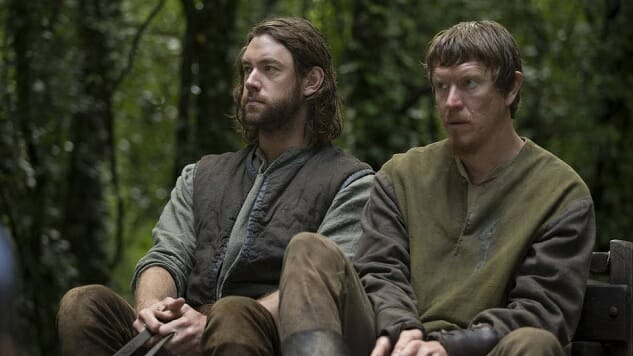
Tough luck for all you Lowry/Wilkin shippers: You ship is still anchored at port. Those two crazy kids haven’t knocked boots yet, which is surprising, and not in equal measure. We’re only six (technically five, if you count the pilot as a single entity) episodes into The Bastard Executioner’s opera of suffering and misery, too soon for Lowry and Wilkin to make the primal, passionate bond that begets steamy forbidden lovemaking. At the same time, this week’s installment, “Thorns/Drain” (pronounced pretty much exactly as you’d expect, but trill the “r”) is approximately ten hours long, give or take eight and a half, and brims over with chatter about religion, philosophy, British history, Lowry’s familial history, and revulsion at the sight of a little torture. You’d think there’s time in there for at least a peck on the cheek.
But no. Neigh. Nope. Alas, our lovebirds-to-be have not quite taken flight, and frankly at this point that development is largely what The Bastard Executioner’s audience is waiting to see realized. (Does the show have an audience? Ratings have been decent but not great, disappointing but not terrible, so that’s an optimistic “yes” for the time being.) Granted, there’s more to the show than waiting for Wilkin to realize that his dead wife’s cryptic message in the premiere refers to Lowry and not to Jessamy, who is becoming more problematic—not #problematic, but rather “expose Wilkin and get him killed” problematic”—by the moment. For instance, there’s also the delightful promise of additional violent rebellion.
That promise necessarily demands the return of the great Matthew Rhys, who we have seen stirring up trouble between England and Wales in the past on shows like Archer. Here, of course, he’s playing in a sandbox with more gravity than that—we’re talking about a post-Madog ap Llywelyn Wales, a Wales that exists firmly under the rule established by Longshanks and maintained by his awful eldest surviving progeny. Other shows that work in The Bastard Executioner’s mode of brutal sorrow merely hint at the atrocities of world medieval history. Kurt Sutter is actually reenacting it, taking the creative liberties due him along the way. If the show’s plot is heavily theatricalized, it has a better basis in reality than its peers.
So here we are with Gruffudd, the Wolf himself, forging an alliance with Lady Lowry. But it’s easy to team up with your half-sibling against the tyrants who labor endlessly to erase your cultural identity, so really, this plot thread ends up being more about further rounding out Lowry as a character than moving the narrative forward. There’s no tension here. There’s just inevitability. As much as it involves Gruffudd and Lowry, the major conflict of “Thorns/Drain” centers on Lowry allowing herself to support her brother’s uprising: She’s coming around to the notion that diplomatic talks and dignified governance alone won’t change bupkis for her countrymen. You need swords for the kind of systemic change the Welsh desperately need, which makes Lowry’s meetings with Gruffudd important, even if they’re treated as less of a big deal than they probably should.
The meatier stuff of “Thorns/Drain” hangs on Wilkin’s identity nearly being discovered, again, for the hundredth time, as Milus holds his knowledge of who Wilkin really is over his and his friends’ collective heads. In other words, it’s a lot of repetition and wheel-spinning. When Wilkin and Toran try to sneak weapons out of the castle and into the hands of Welsh fighters, they’re found out by one of Milus’ knights, whom they dispatch in short order to buy themselves time to get the hell out of Ventrishire. The plan fails, Milus catches wind of their troubles, and dammit, we’ve been here already. In fairness, Milus’ gift to Wilkin and the boys—one of the men present for the massacre of their village—affords Toran a chance to do something apart from grimace, which means Sam Spruell actually gets to act. It’s a great, gruesome scene where Toran’s spiritual anguish locks horns with the tortured soldier’s physical anguish (how odd that the objectionable qualities of torture invite us to feel sympathy for characters we’d otherwise loathe), but it’s the equivalent of watching the show walk in place.
More interesting by far is what transpires between Lowry and Gruffudd, and what we learn of Annora, the Seraphim, Father Ruskin, and, most of all, the Dark Mute. Maybe “Thorns/Drain”’s climactic reveal shouldn’t feel like such a big deal, but seeing the Mute’s armoire of Crusader gear is still enough to set your hairs on end, even if The Bastard Executioner’s threads of religious persecution remain muddled in terms of intent and direction. After last week’s excellent “Piss Profit/Proffidwyr Troeth,” any follow-up ran the risk of looking comparably shabby, and though “Thorns/Drain” has enough grisly and sentimental pleasures to keep it afloat, it wastes a bit of the head of steam the series has built up. Extra running time isn’t the solution to that problem—focus and clarity of purpose, however, are.
Boston-based critic Andy Crump has been writing online about film since 2009, and has been scribbling for Paste Magazine since 2013. He also contributes to Screen Rant, Movie Mezzanine, and Birth.Movies.Death. You can follow him on Twitter. He is composed of roughly 65% craft brews.